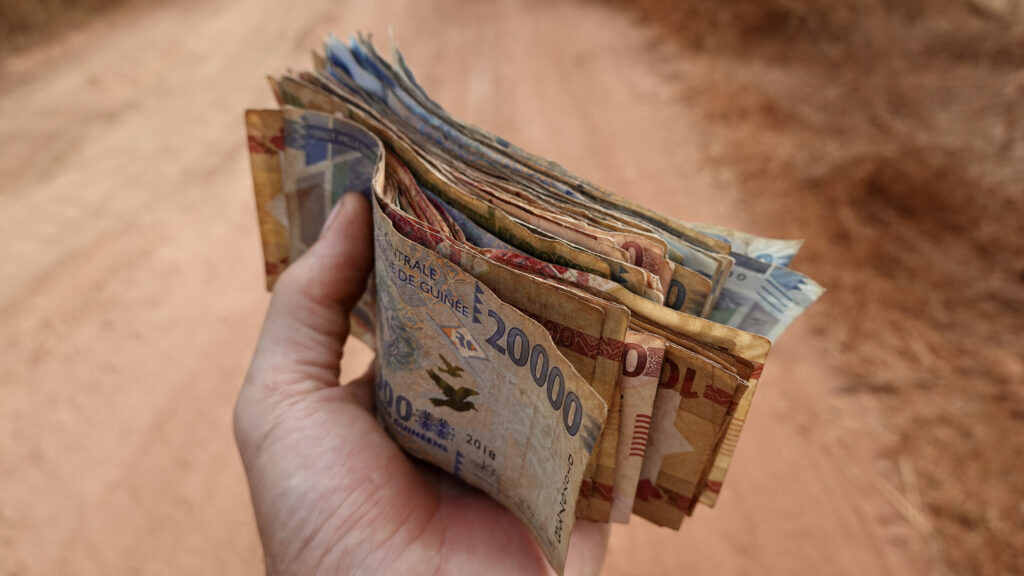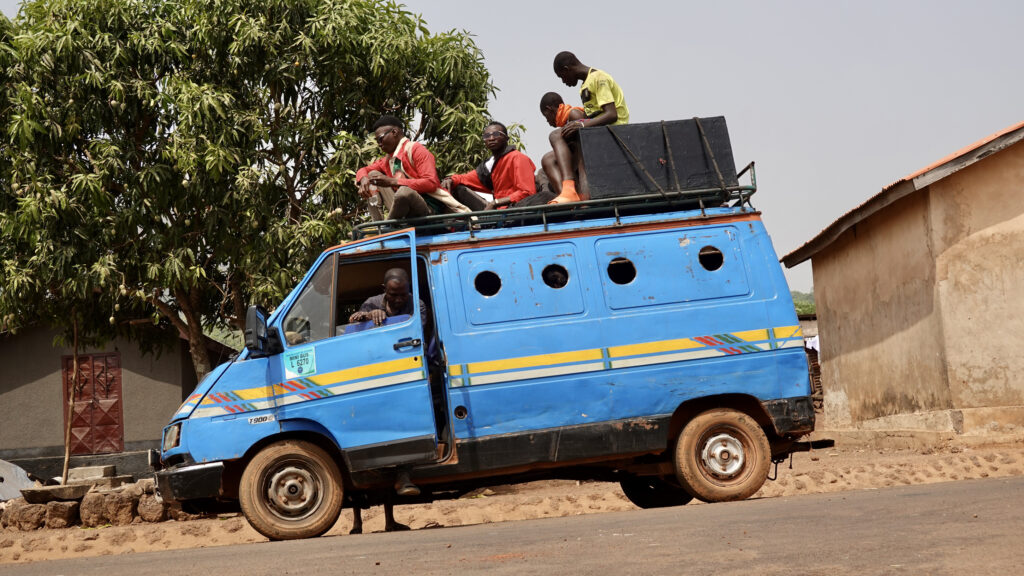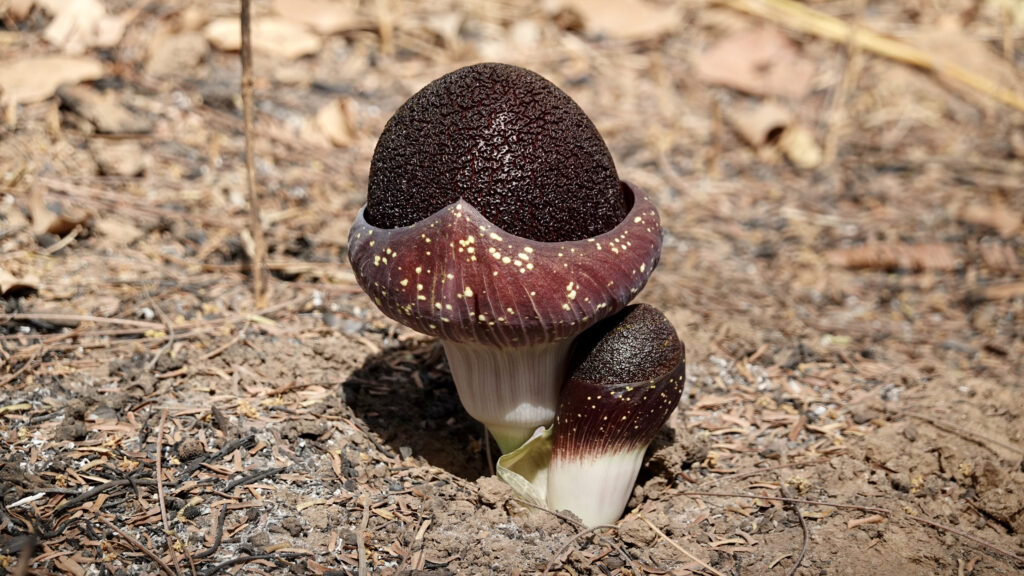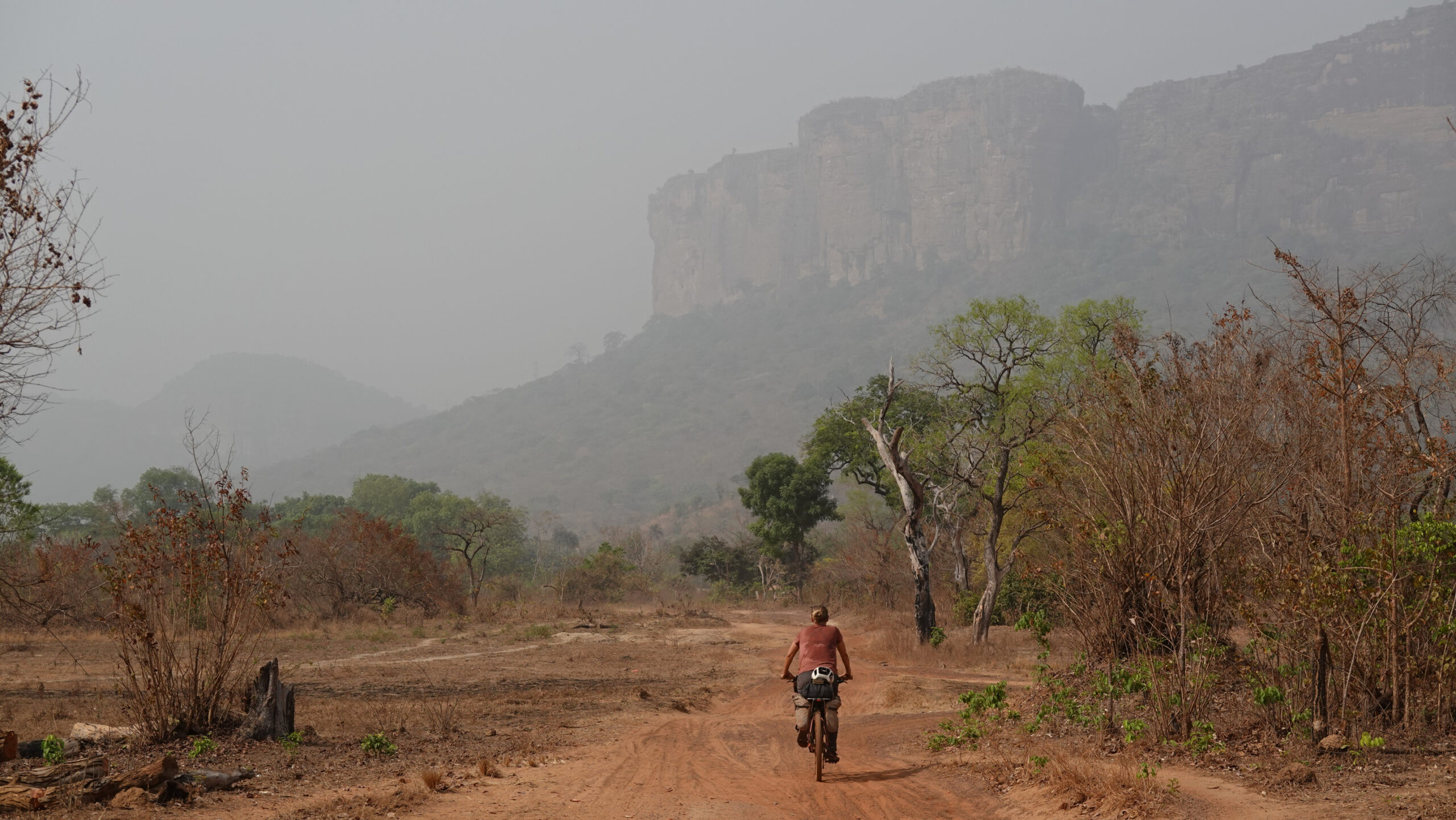In Guinea we found again what we love most about bikepacking. Rough dirt roads through mountain landscapes, with small villages filled with welcoming people who live life in a completely different way than in Denmark.
But we also found new friends and much-needed luxury in Conakry's expat environment, as well as a few experiences we will never forget.
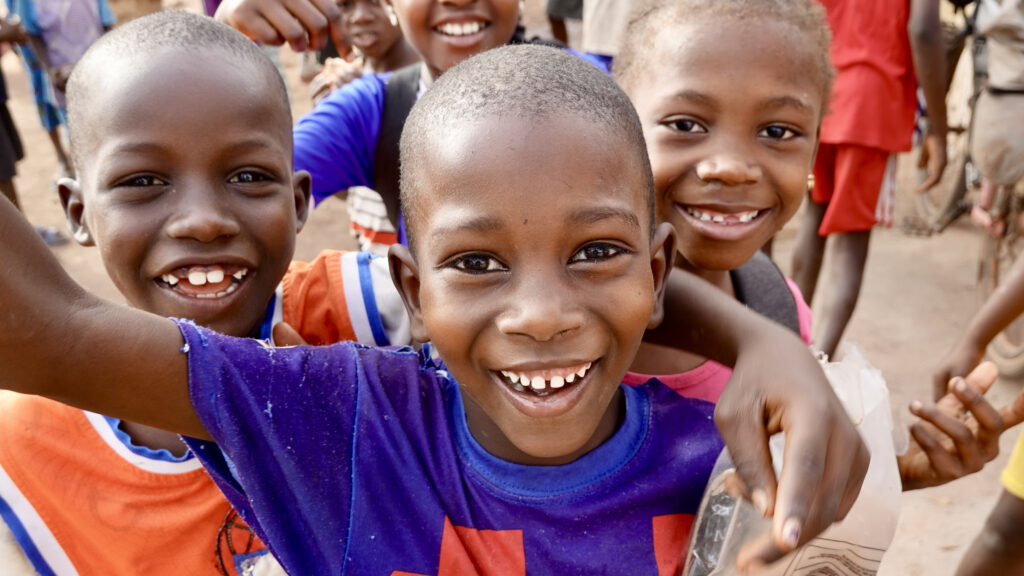

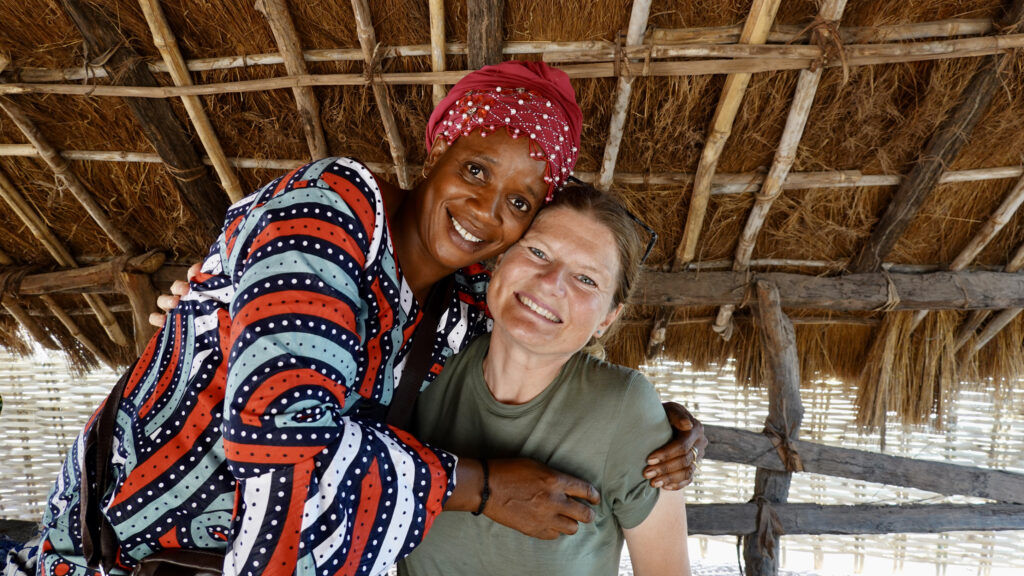
Even before we parked the bikes in front of the migration office in Foula Mori, we had our first wild experience, which made us open our eyes. We have only been in Guinea for half an hour when we cycle along the dirt road and spot a ridiculous tree stump in the middle of the road. The stump is right in front of a house, and as we take off, Kenneth thinks that it is a child dressed up. We've seen that before. To play along with the child's dressing-up, Kenneth lets out a mild "Uuuuuhhhh woooaaaaw", which immediately sets off the mischievous tree stump, which with loud complaining sounds rises to full man's height and raises two machetes in the air. As the bark-clad figure slowly walks away from us, it screams and complains as it slams the machetes together and makes a metallic sound. Our blood freezes to ice with fright, but also with shame. Two men come running out of the nearby house and speak to us intensely in French. We apologize, but do not understand what they are saying, although it is clear that we have disturbed something important. We hurry to ask for directions to the migration office, and the men point down the road. We speed up the bikes and leave the stage embarrassed by the disturbance, but also with a thousand questions about what we just experienced.
We still haven't managed to get an answer to that, but we suspect that the figure is a spirit from the tribe's original culture. But good or evil spirit we do not know. And we also don't know if our disturbance did harm or good.
A little later, when we had been in Guinea for an hour, we found the migration office in the small village. There was a different calm here, and two men sat down behind the dilapidated desk. One put on reading glasses and read from our passports, while the other, with neat handwriting, led us to the minutes in a large book. When the registration was over, we asked if we could sleep somewhere in the city. The answer came promptly: "You must pitch the tent here next to the migration office. Welcome!”.

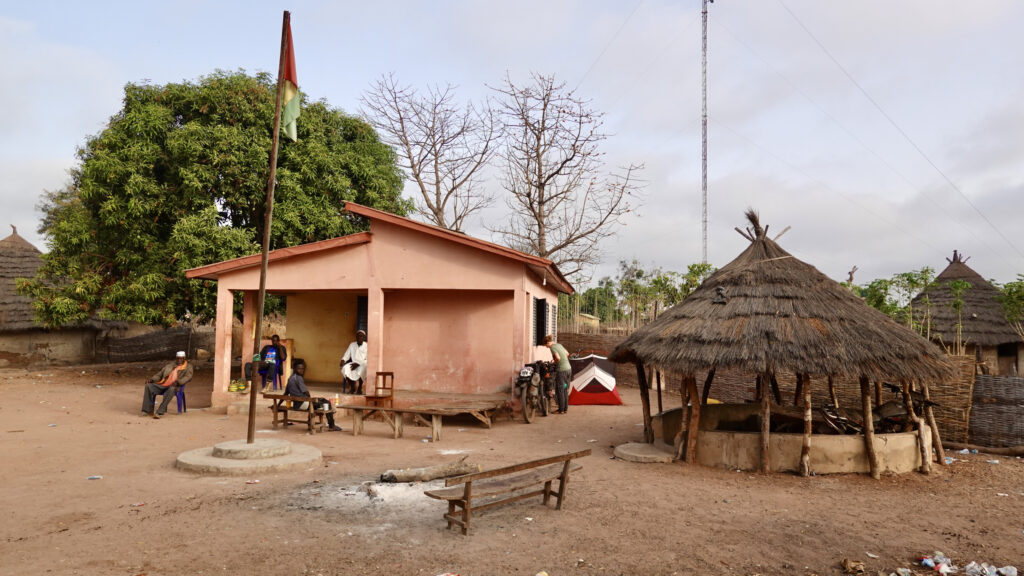
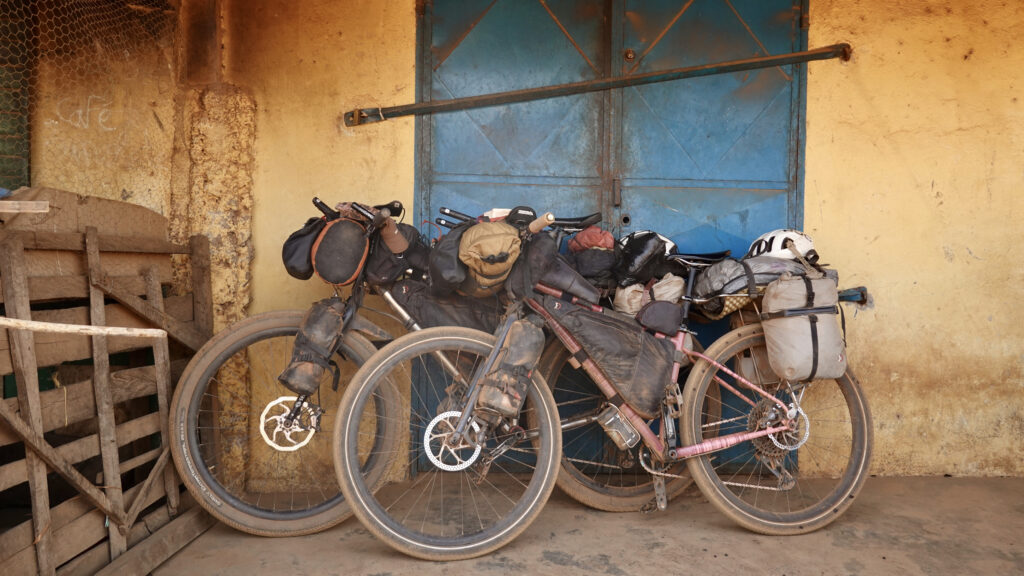
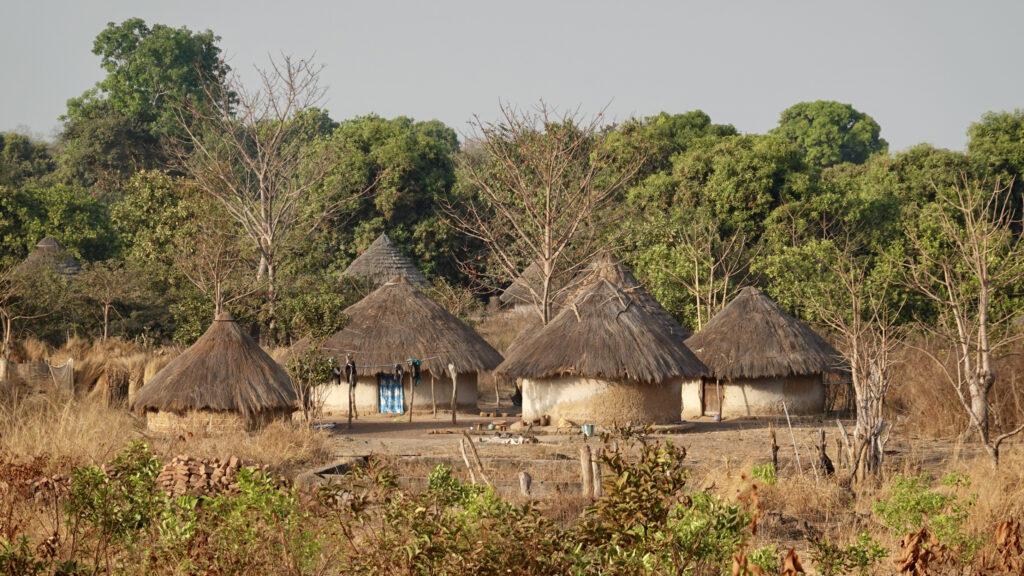
We are in the highlands of Guinea, Fouta Djallon. The northwestern corner of the country. The area is known for its beautiful nature and many waterfalls. Many of Africa's most important rivers originate here: the Niger, Gambia and Senegal rivers are the 3 largest, which originate in what is called "West Africa's water tower". But we are here primarily to find small winding dirt roads that take us far into the mountains, to the very small traditional communities. And we won't have to look long. In fact, there are only a few main roads in this corner of the world and none of them are paved.
On the contrary, it must be said that it is impressive that the small, completely smashed dirt roads we find are actually also used to transport both people and goods. You take a second glance when you are about to push your bike up a narrow path, too steep for cycling, and then a truck comes into view on the top of the hill. The trucks take up a bit too much space, so they are not the preferred means of transport. It's the four-wheel drive. But they are, on the other hand, loaded with the same weight and number of people as can be in a truck. Often we see loads that are 2-3 times higher than the car itself. Usually with a couple of young men sitting at the top, or hanging on the back. But the most popular means of transport must still be the scooter. It can also easily seat 3 people. Or more. We have seen as many as 2 adults and 3 children on the same scooter. Often we also see the scooters loaded with 3-4 large bags. Only rarely does it go wrong here on the small roads. It is a different matter on the fast asphalt roads near the capital, but we will return to that.
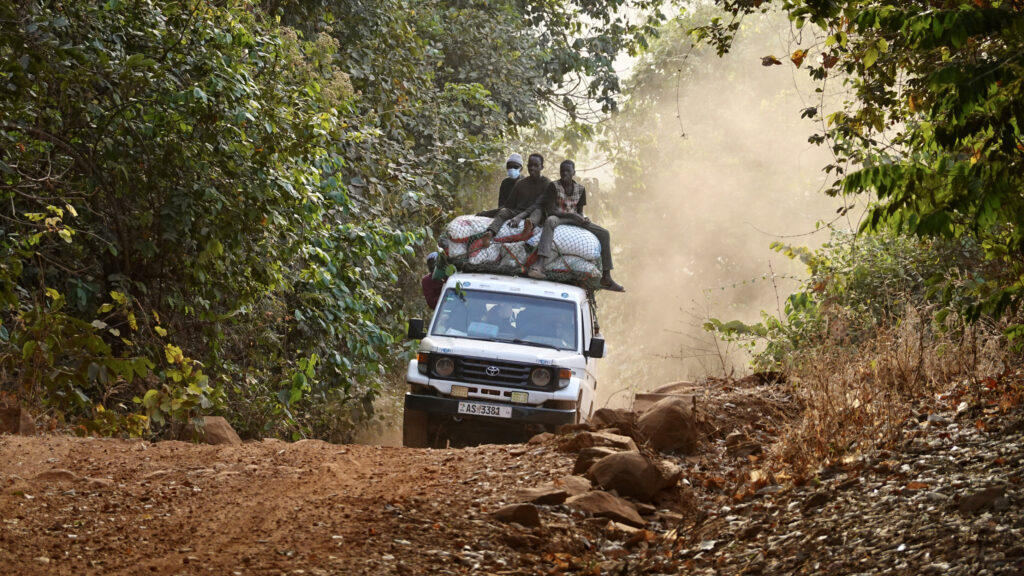

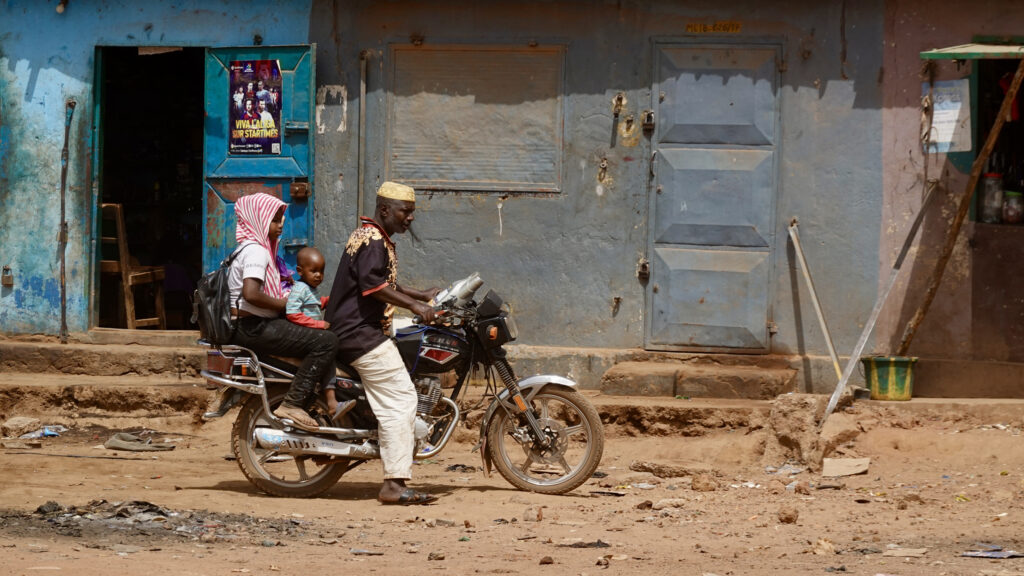

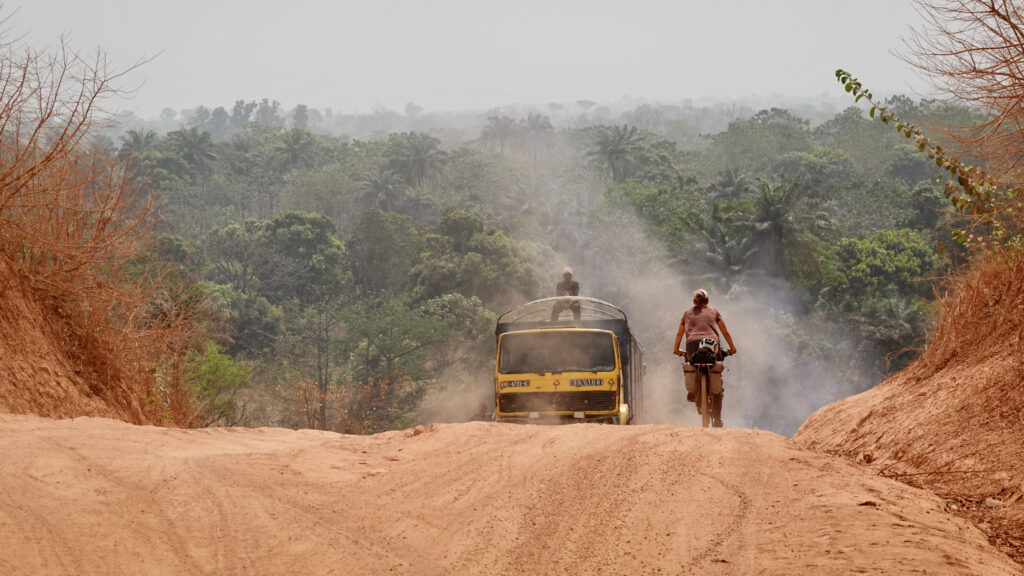
Every evening we camp in beautiful surroundings. An evening in a huge valley. Another evening by a large waterfall. It's quiet here and the locals we meet are just curious, but they don't mind us pitching the tent. We do not feel unsafe. In other words, the many stories about black mambas, which are one of the world's deadliest snakes, gradually start to make us look closely in the trees where they sleep at night. We thought they were only found in East Africa, but now we have doubts. And better to be a little careful than to be bitten, because then there is only 20 minutes left before you stop breathing.
When we camp, the menu is rice, lentils, millet and maybe a tin of sardines. But as soon as we get to a village, we always try to see if we can buy a meal locally. It's great to try the different dishes they have, and usually it's really good and always with local ingredients. However, the variation is not that great. It's rice with sauce. There are a few different sauces. A green which is the leaves from potato plants, a brown which is peanut sauce, usually with fish, and then sometimes there is some lamb or cow in red palm oil.
In Kolenté, however, we were lucky to hit a market day when the whole town was on the other end. There was a huge chaotic jumble of people. Some half-drunk, some just in high spirits, scooters and taxis pushed their way through the dense crowd while loudspeakers blared music and sales pitches for all sorts of products. Here in the middle of this chaos we found Mariam, with sublime serenity and a huge warm smile. She had the market's most popular food stand with 10-15 different plastic buckets filled with delicious things. In zero point five, she had whipped up a delicious potato salad with chicken for us. It was a relief to have a little variety in the diet, and it was fantastic to sit on her little wooden bench and follow the life of the market, which unfolded before our eyes. What a folk festival.
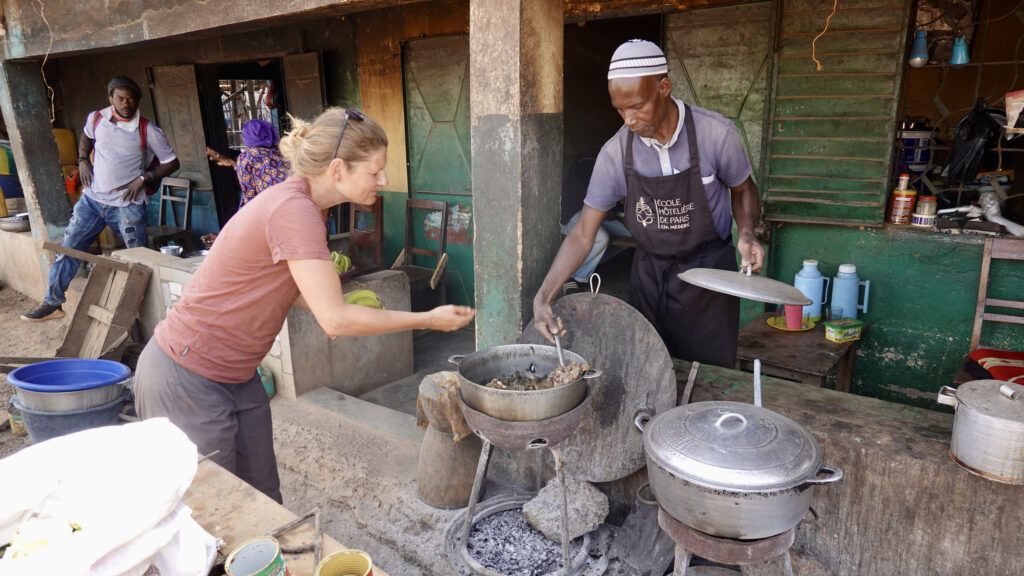

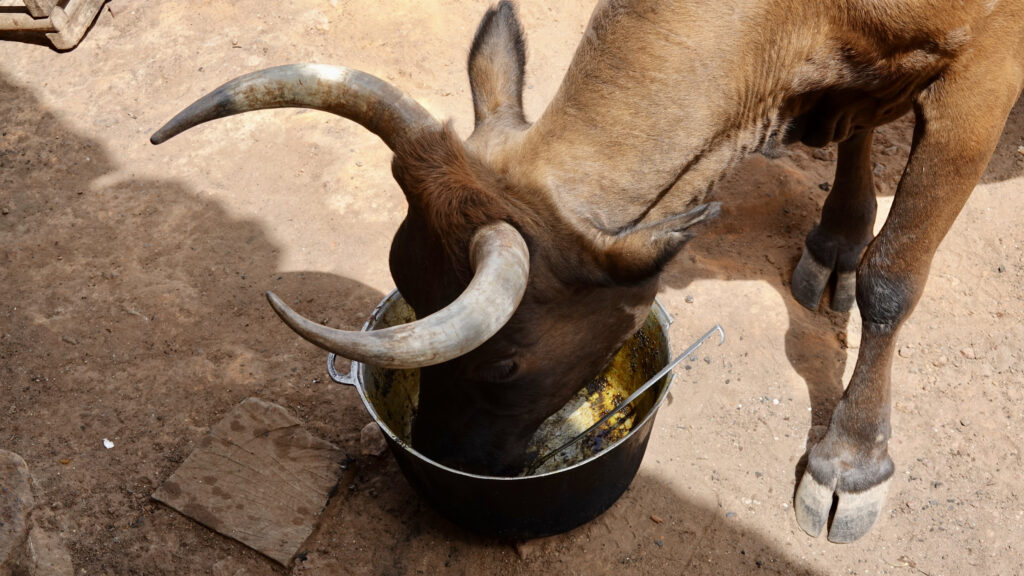
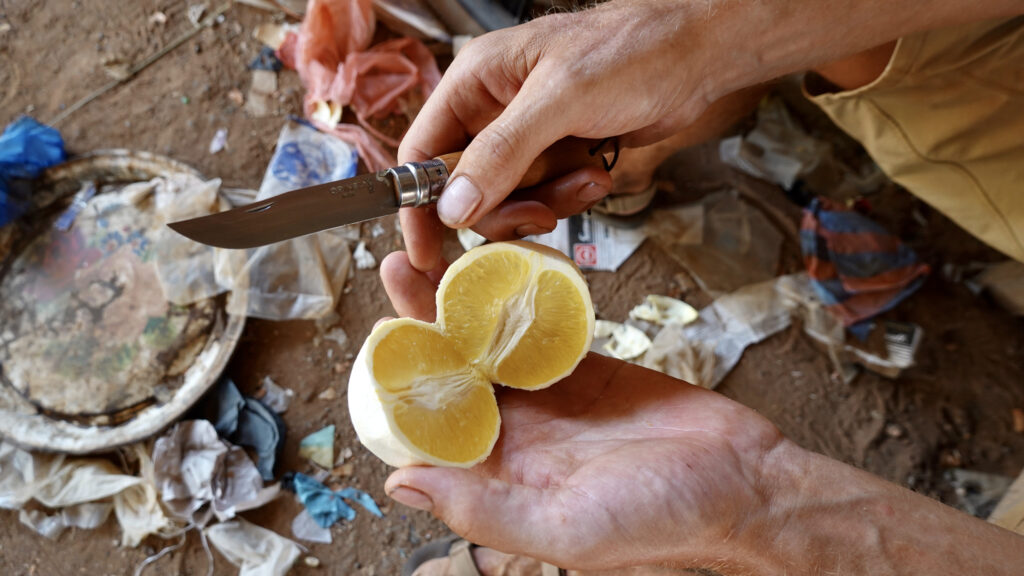

Eventually it was time to leave the cool heights of Fouta Djallon. We headed down into the heat and humidity, heading for the capital, Conakry. We were about to run out of cash, so we had to abandon the last little loop on the dirt road and head out onto the paved main road instead. The red dust from the dirt roads had also left its mark on clothing and equipment, to say the least. And on us. So in that way it was fine with a bit of asphalt. This meant that the kilometers ran more easily, but there was also a downside. The black surface of the asphalt absorbs the sun's heat and creates an oven. The thermometer in the cycle computer was up to 48 degrees in the middle of the day. The sweat runs down the eyes and stings. All clothes are soaked. The bags get scalding hot, and there is nowhere cool on the bikes, so all the water we drink is scalding hot.
Asphalt also has another downside. They drive fast. In one place we saw a truck which had torpedoed a house. A bus had driven into the ditch. A four-wheel drive had rolled down the slope and was under a bridge. The combination of the primary driver segment being young men with flapping forehead flaps, overloaded cars that can easily get out of control, and excessive speed on the "easy" roads means that all the accidents happen close to the capital. Out in the country, where it feels like sitting on a rodeo bull, when you slink away on the dirt roads, nothing serious happens.
But other good things also came with the slightly larger cities and more populated areas. Because here there were suddenly fruit and vegetables everywhere, and we started to munch on ripe mangoes. The cities were in a way more fun than the small villages, where it was often very quiet. Here there was a lot going on and celebration and colors.


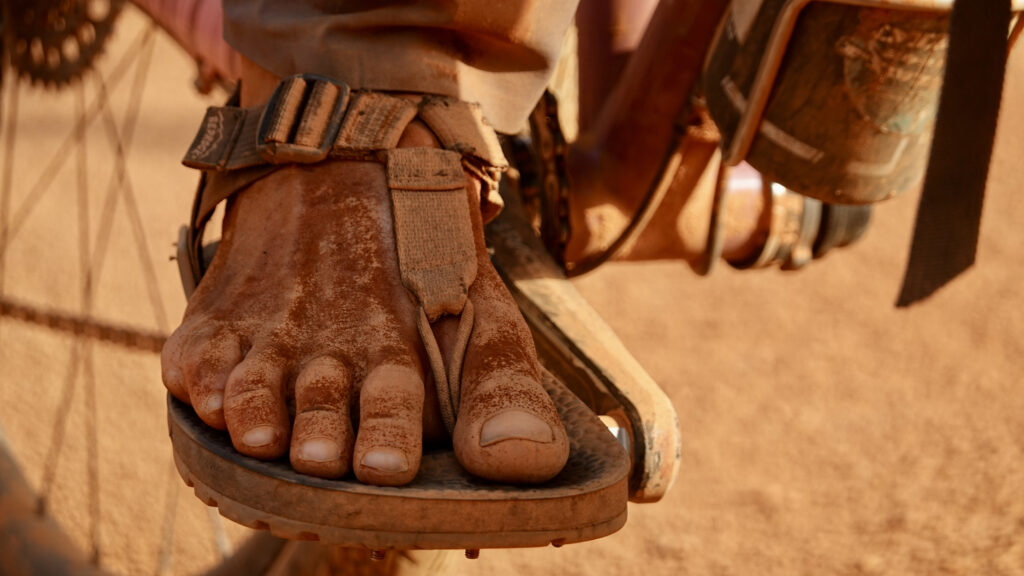
When we entered Conakry itself, the good atmosphere became really intense and unfolded in a wild and chaotic experience. We had about 25km of cycling through the suburbs, on big wide roads with 2 lanes in each direction, before we hit the center itself. It may sound very straightforward, but on that entire stretch, you must not lose concentration for one second. People drive close. And they run fast. There are food and fruit stalls right next to the road, so everyone who needs to shop goes out onto the carriageway. Cars and scooters consistently drive on the inside of the wrong lane – that is exactly where we ride as cyclists. Everyone is pushing all the time, so the noise is infernal. The cars ooze black smoke at our heads. Locals shout for us to stop and talk. All scooters slow down and glare at us. There are fires in large makeshift landfills on the sides of the road, which shroud the road in thick smoke. And last but not least, there are no markings on the road, so all vehicles merge with each other at all times according to the principle "Only look forward, never back." Never touch the brakes. And above all, so push all the time!”. To be honest, we're probably a bit happy that it's not the first time we've cycled into a big city, but Conakry still takes the prize as the wildest we've tried.
It was with some relief that we could navigate directly to Kakimbo Towers and start the second part of our Guinea adventure, rather than having to cycle through the city looking for a suitable hotel.
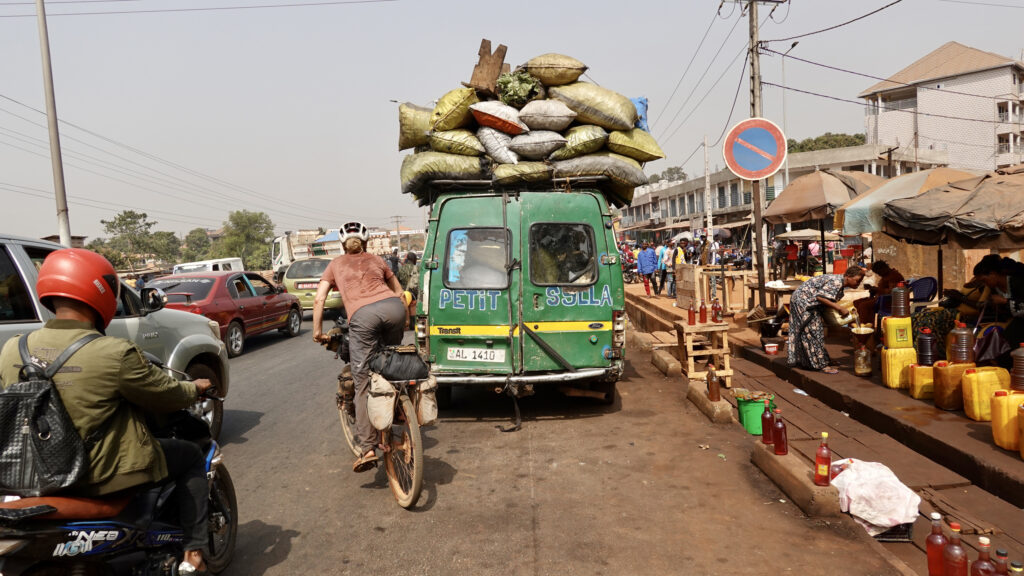


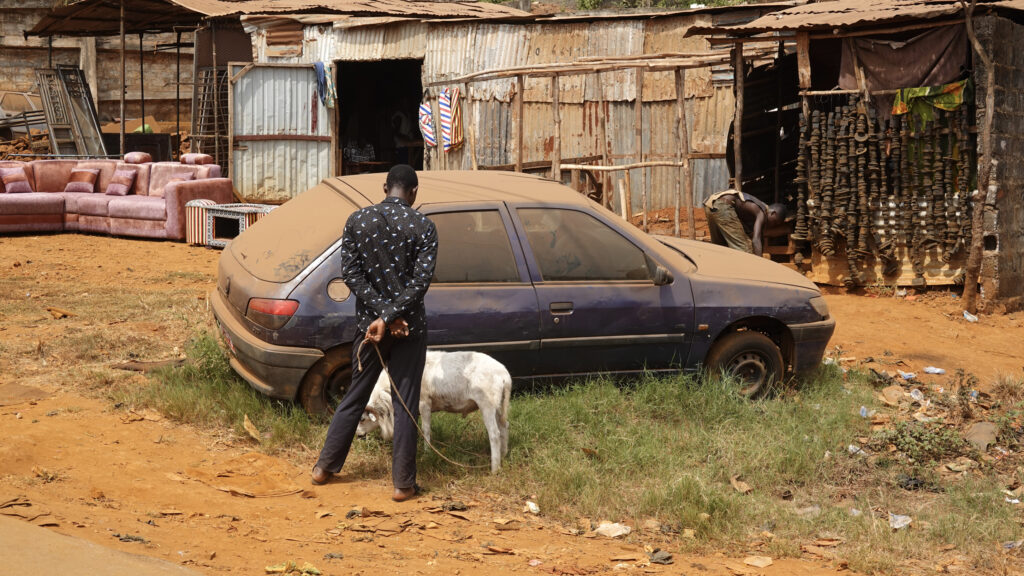
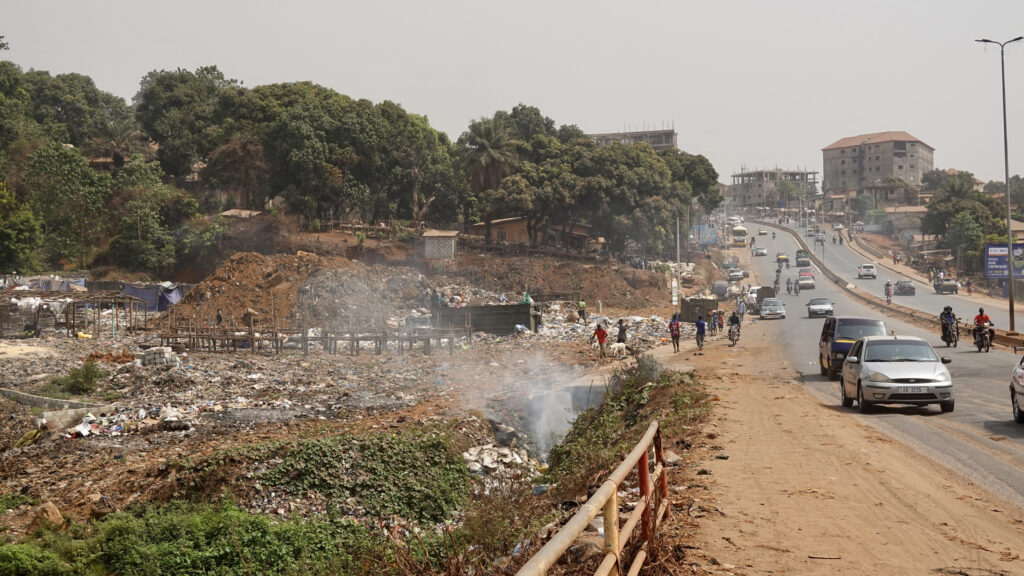
In Conakry we had to apply for visas for 3 countries further along the route, so we knew we would have to be here for a few days. We had heard from others that Conakry, on the other hand, is a city you don't really want to be in. So to avoid that dilemma, we had written to the only guy at Warmshowers who lives in the city. And luckily he agreed to let us stay with him.
But we had no idea how lucky we were or what we were getting into.
It turned out that Peter lives in the most luxurious building in Conakry, Kakimbo Towers, with 27 floors, gym, swimming pool, supermarket and what do I know. As he said: “This is the most luxurious place since Dakar!”. And all this was to become our home for the next few days.
Peter had his girlfriend visiting, so instead he had agreed with his colleague that we could stay with them. When we walked through the door at Elizabeth and Jared's, on the 25th floor, we almost had tears in our eyes and couldn't believe our luck. Elizabeth and Jared are incredibly nice and we immediately felt very welcome. We stood there in the living room, in our sweaty, disgusting cycling clothes, and asked if we could take a shower first.
When the first rays from the giant shower head poured down on our dirty bodies, the red water flowed into the drain and our bodies were gradually transformed from red dust monsters to respectable citizens of the world again. Never has a bath done so well.
That same evening they had invited guests, and we were gradually introduced to expat life in Kakimbo Towers. People from many different countries live here while working at the embassies or various relief or business projects. As someone once said, Kakimbo is a little paradise, so many who live here never experience Guinea because they never leave the building.
Jared and Peter work with emergency aid in Guinea and Sierra Leone, for USAID. It was very interesting to hear what they actually work to do, but it also quickly became a topic of conversation about how political their work really is. We must admit that our view of what used to be called U-country aid has been rather challenged and a lot more nuanced than we had expected, through the things we have seen and experienced from the bike. That is why it was really exciting to discuss with some who actually work with the aid on a daily basis. Also, Elizabeth is from Tanzania but went to college in the US so she had so many insightful and interesting points from her perspective.
If this article is not to develop into a long tirade, then perhaps we should stick to the fact that Lars Løkke, Denmark's foreign minister, probably has a point when he came home from Africa recently and said something like: "We will probably to admit that we are not as cool in Africa as we thought. And we will probably have to change our strategy quite a bit, in order to continue to be relevant in the part of the world that is changing a lot these years". It is reproduced freely from memory, but the point is clear. China and a number of other countries have great influence in Africa. In Africa, you don't really often share political values with the West. In Africa, much of the "help" we have given over the years has completely failed.
It will be really exciting to see what happens here in the next 10 years.

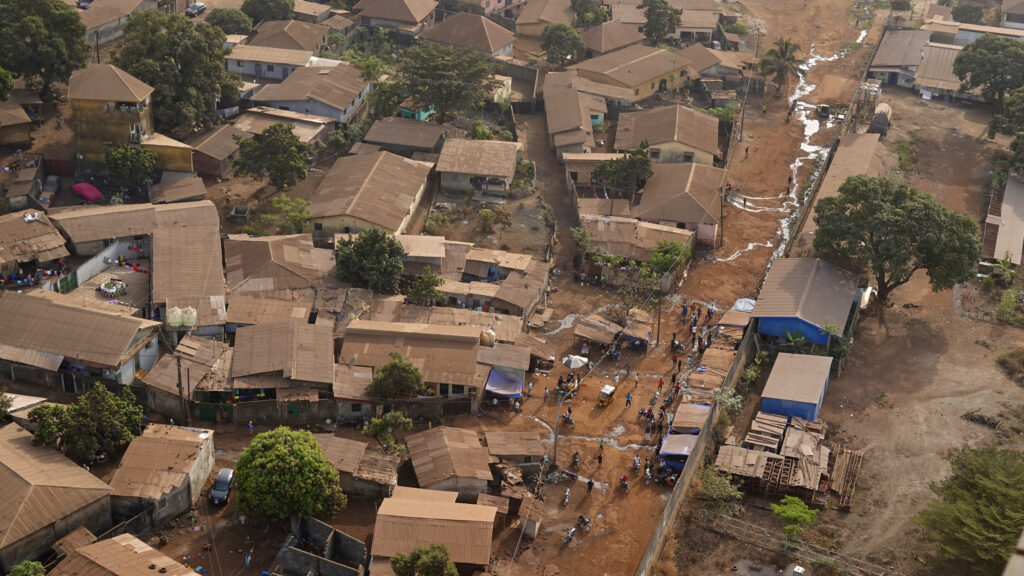
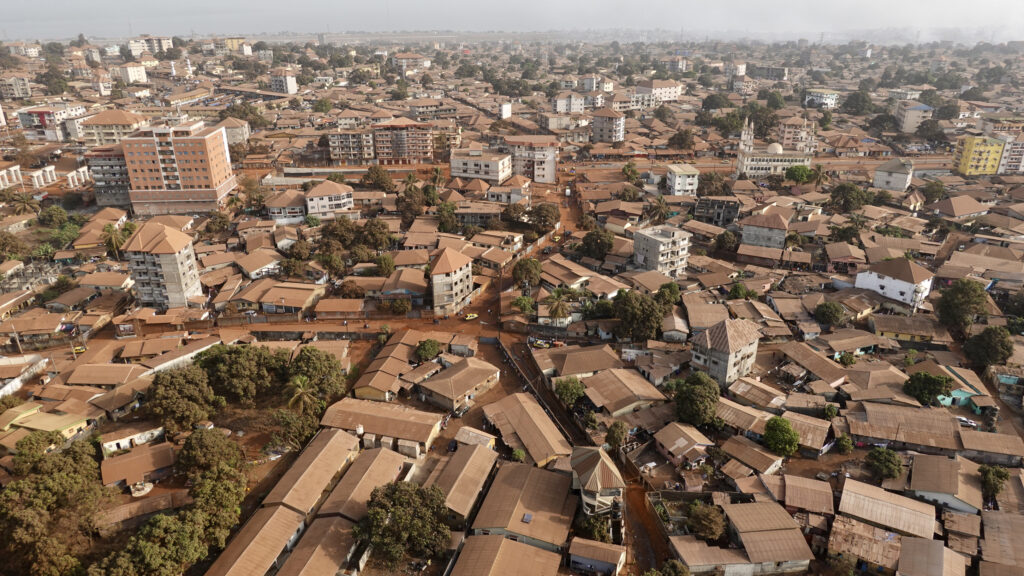
The conversations continued the following evenings when we met over dinner after spending the day at the various visa offices in the city. We had to apply for visas to Liberia, Ivory Coast and Nigeria. We started with the hardest part. Nigeria is known to be quite complicated to get a visa for. Firstly, the embassy is only open a few days a week, but luckily the timing was right to visit the office on Wednesday morning. We arrived by motorcycle taxi with the wind in our cheeks, after a hair-raising ride in the back seat, through Guinea's morning traffic. With us we had a large stack of photocopies of passports, application letter, route plan, receipts and the application form itself, as well as a large stack of banknotes. Before, we had uploaded the same documents and filled out an online application, as well as prepaid 108 dollars.
"Normally" people have applied for a visa to Nigeria in Benin, where you have to buy a fake citizen card before you can apply. At the embassy, it is then a matter of finding the lady who accepts bribes in order to let the application go through. A nerve-wracking and rather illegal way to get the visa. But just a month ago, rumors surfaced that you could apply for the visa in Conakry. Even without a bribe. It was hard to believe, but of course we wanted to try that option first. So here we sat, on the sofa in the reception in Conakry, with a slightly high pulse and fingers crossed. A lady came and talked to us. She reviewed our documents and was not at all impressed with what we brought. There were many objections, but as the conversation progressed, we could settle for making a hotel reservation in Nigeria and walking down the street to a photocopier to make a copy for her. And then incidentally pay 2 million Guinea francs per man. On the other hand, the probability of actually getting the visa seemed high. So we paid and said: "See you tomorrow". Thus, the visa has so far cost just under DKK 2,500 including mototaxi back and forth to the embassy.
The next day we sat again on the sofa and waited. And waited. Until another lady, without so much as looking at us, came and put our passports on the table in front of us, as well as a receipt for 2mil. We cheered loudly, internally, and left with huge smiles on our faces. A big hurdle has been overcome.
It is not because it is intractable with the various visas in West Africa, but it takes time. Many of the applications to West African countries are complicated and require many documents and applications in certain cities. The rules change often and at short notice, so you have to keep an eye on them. In addition, they are expensive and the processing time is often a few days. When you multiply that by the fact that we visit approx. 20 countries in Africa, it will undeniably be a demanding task to keep track of.
The Ivory Coast was also a mouthful, but after all a bit easier.
Liberia was a dream. We met at the embassy. At the gate sat a guard who asked for the passport, 2 passport photos and 100 dollars. The next day we could pick up the visa. Even on a Saturday. It took 3 minutes each time.
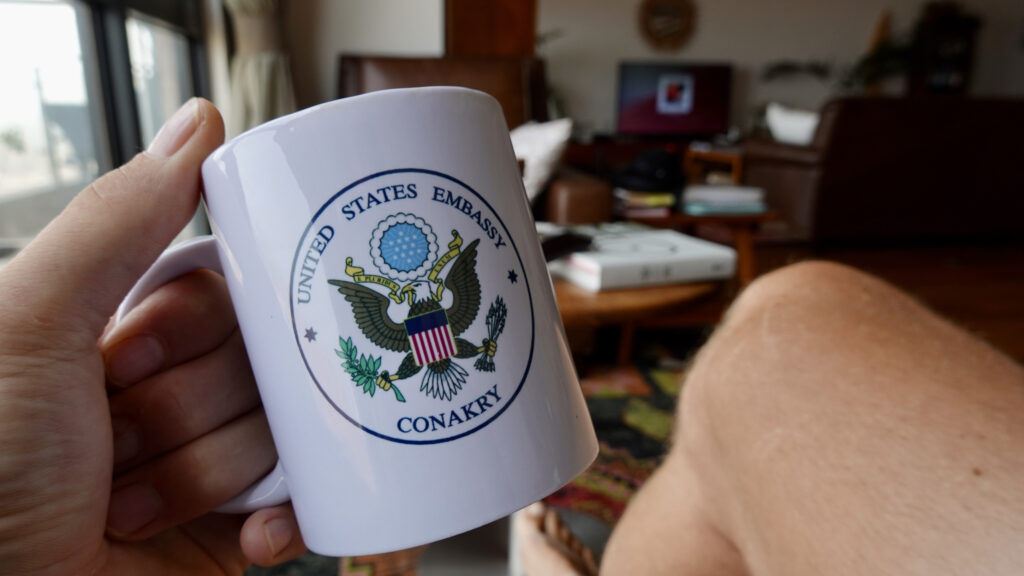
When the 3 visas were in place, we could actually leave Conakry. But that did not happen. We came back from the Liberian embassy on Saturday afternoon, to a message from Jared: “The US ambassador in Conakry has heard about you and he wants to meet you. He is down by the pool”.
What?!!
Of course, we didn't want to miss that chance, so we jumped into some swimwear and a T-shirt and took the elevator down. And sure enough, the ambassador and his wife were lying on their own bath towels by the pool. The ambassador started the conversation in beautiful Danish with a funny accent. He has been stationed in Denmark for several years. Troy and Kathryn were sweet and funny and the conversation flowed easily. After 10 minutes they invited us to dinner in the ambassador's residence that evening. And we who thought that our luxury experience with good people in Conakry could not get any better.
Back at the apartment, Jared got the agreement in place with when we should come and then there was a clothing crisis in it. Kenneth only has the clothes he cycles in, as well as a pair of thin training pants for rest days. Marie is lucky and has been given a dress by Hanne in Gambia. Jared assured that it would be a casual evening and dressed casually himself, which gave some peace.
When we rang the doorbell, the ambassador himself in red basketball shorts opened the door to Kenneth's great relief.
We were invited down to the pool in the garden for a drink as the sun set over the sea and millions of bats flew past their garden. It was an absolutely magical start to the evening.
The conversation again flowed easily and both Troy and Kathryn were really entertaining and pleasant.
When the sun went down, we went inside and ate fish tacos and drank beer. Perfectly unpretentious and relaxed. Until the phone rang. On the phone was the EU ambassador, who lives two houses down the road, and who now invited to an impromptu garden party with a local band that she had hired.
Once again the evening took an unexpected turn and once again Kenneth feared the dress code when Troy said: "I'll just change clothes to something less casual". But it quickly calmed down when Troy came back from the wardrobe wearing an even more colorful pair of shorts and the same polo T-shirt.
At the EU ambassador's house, we were shown down to the garden, where rows of chairs had been set up for a concert and a local band was ready to play. We greeted everyone nicely and formally, but fortunately could feel that the atmosphere here was also relaxed.
The band started playing and more people flocked. It was still intimate and everyone was dancing. Not long after, the evening's most famous and prominent guest arrived: Grand-P. A dwarf who enjoys ambassadorial status in Guinea - because he is a dwarf. Apparently being a dwarf is considered a special privilege. Everyone greeted him and wanted selfies. However, we were too shy to ask. A few days ago we saw a huge advertising poster with him down in the city. Undoubtedly the evening's celebrity no. 1. When he went on the dance floor, everyone followed. The EU ambassador, in bare toes, proved to be a really good dancer. The USA's ambassador in speckled shorts with rhythm in the body. Us in cycling clothes with shy dance moves. And Africans in corduroy suits with totally extravagant dance steps, which put everyone on edge.
And that's how our fun Saturday night in Conakry ended.

Sunday was spent with Elizabeth and Jared just enjoying ourselves and nursing our hangovers while laughing our heads off at the evening's escapades.
Some of what we had been looking forward to from home, and hoped we could experience, are the many different realities that exist close, side by side in Africa. In Guinea we got it.
The first 10 days we cycled through rough terrain in the mountains and met people who live in small huts made of clay and straw.
But in Conakry we met people who live in the completely opposite social class. In a luxury that no one in the mountains can even imagine. That luxury is really the western way of life. Neither more nor less than the same way we live our lives in Denmark. But because we experienced it right after cycling in the mountains, it had a powerful effect on us.
The deep political conversations we had with Elizabeth and Jared were really rewarding. To that extent, we have enjoyed being able to dive into the complicated picture of Africa, which we are gathering from an infinite number of small pieces.
Common to both places, both the mountains and Conakry, is that we met people who live with their hearts first and an incomparable openness and friendliness. Thanks for the experiences.
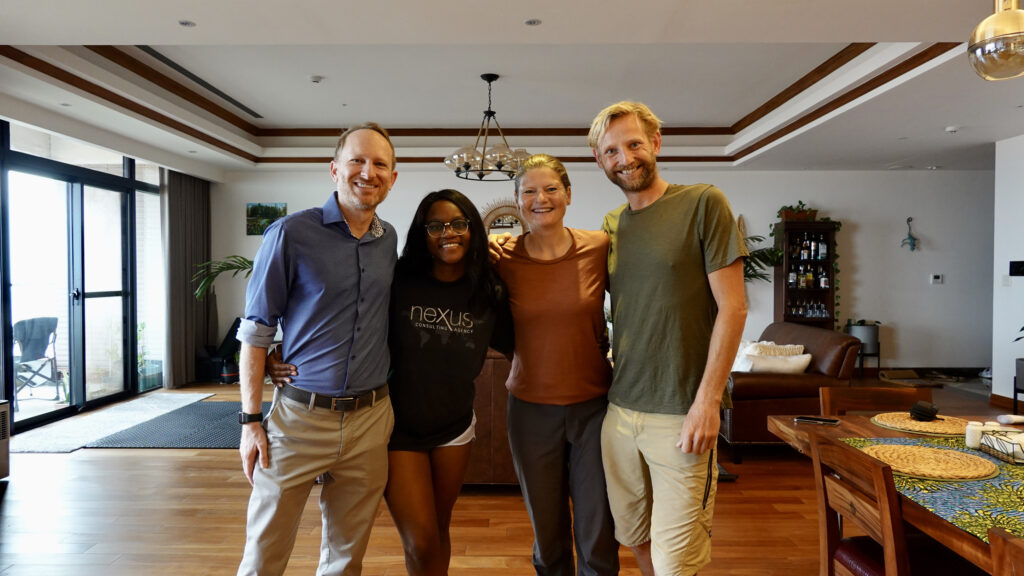
Here are a few more pictures:
